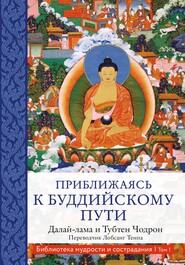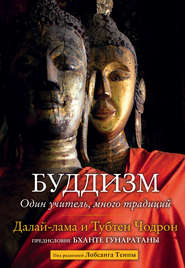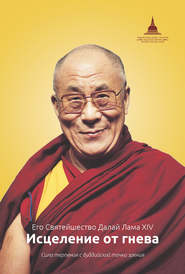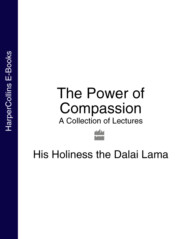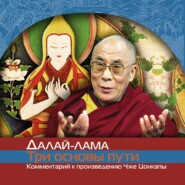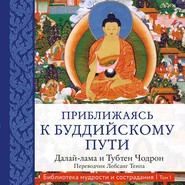По всем вопросам обращайтесь на: info@litportal.ru
(©) 2003-2024.
✖
Awakening the Mind, Lightening the Heart
Автор
Год написания книги
2019
Настройки чтения
Размер шрифта
Высота строк
Поля
The awakening mind is also compared to the sun because when the sun has risen, not only is darkness unable to obscure it, but even a single ray of sunlight can dispel darkness. So even if you are only able to gain a partial realization by listening to this instruction, you will be able to suppress the self-centered attitude, which is induced by the misconception of self.
It is important to analyze whether our self-centered attitude arises from the misconception of self. Generally, the stronger our misconception of self, the more tenacious our self-centeredness. For ordinary people like us, these two types of attitude are almost inseparable and reinforce each other. Some beings have eliminated ignorance, the misconception of self, but are not as courageous as bodhisattvas in working for the welfare of others. Although their realization of emptiness has dispelled their ignorance, due to their lack of courage and willingness to sacrifice themselves for the welfare of others, that realization is unable to dispel their self-centered attitude. Conversely, bodhisattvas who have not yet realized emptiness can reduce the grip of the self-centered attitude because, due to the force of their awakening mind, they have developed the courage to sacrifice themselves for the welfare of others.
When Buddha Shakyamuni actually appeared in this world the time was already being described as degenerate. Now the times have degenerated even further. Sentient beings are preoccupied by disturbing emotions and continually engage in negative activities. They do not like to see excellence in anyone but themselves, and when they do see someone successful they are jealous and their hearts are uneasy. They become bent on harming other sentient beings physically, verbally, and mentally. At times like these, even the powerful guardians of Buddhism, the Dharma protectors, those powerful celestial beings pledged to protect the Buddha’s teachings, can do nothing to help and leave for different realms. Meanwhile, negative spirits multiply and become stronger. As a result, we encounter many inauspicious experiences, especially those of us who profess to have entered into the teachings of the Buddha but who always engage in negative activities. In such a degenerating era, if you do not engage in a practice like mind training to really transform your mind, there will be no other way to continue your practice of the doctrine.
These mind training teachings are a tremendous source of inspiration. The instructions on how to transform adverse circumstances into favorable ones are unique and powerful. Human happiness is primarily determined by our mode of thinking. We Tibetans, for instance, lost our nation and became refugees. The destruction, torture, and humiliation entailed by life under the Chinese is unspeakable. In my own case, I have spent the best part of my life in exile. Because of my karmic connection with the Tibetan people, they have much faith in me, and from my side I try to be helpful to them. But the situation at present is very unfortunate. I cannot help my people directly.
When we Tibetans first came into exile, the only things we were familiar with were the earth and the sky. Our problems were enormous. We suffered from acute financial difficulties, and we did not have enough people equipped with modern education. And as if those hardships were not enough, we were in conflict with the People’s Republic of China—an enormous power. That is why I sometimes joke with people that if the Dalai Lama did not have some understanding of the Dharma to fall back on, he would be taking sleeping pills by now. But I do fine without them. Even though I do not have any spiritual realization, some understanding of the teachings greatly helps in times of despair. The Buddha taught that as long as you conceive of true existence and as long as you are dominated by self-centeredness, you will have no peace or happiness. These fundamental teachings help you relax when things go wrong and equip you to face hard times. The oppression and persecution the Tibetans have suffered and continue to suffer under Chinese rule is one of the greatest human tragedies. But just being negative about the situation is not constructive, and losing heart does not help us solve problems. So, in the light of the Buddha’s teachings, we should develop courage.
The Buddha has taught that all sentient beings have been kind to us at some time during our past lives. Even our enemies give us the best training in patience. When we reflect on these holy instructions, in a way we should feel grateful to the Chinese. If we were still living in the same old system, I very much doubt that the Dalai Lama could have become so closely acquainted with worldly reality. I used to live in a very sheltered environment, but now that we are in exile, there is no stigma attached to facing reality. In our own country, we could pretend that everything was in order because it was shrouded under a cloak of pomp and show. I had to sit on a high throne assuming the attitude of being the Dalai Lama. Some of the older officials will recall that in Lhasa our government officials were more concerned about elaborate functions and their rich clothes than the nation’s welfare. They felt they could afford to pretend that everything was fine even when disaster was looming on the horizon. It is quite possible that. I could have become narrow-minded, but because of the Chinese threats and humiliations, I have become a real person. So what happened in Tibet can be seen as a blessing in disguise.
Our contact with the outside world is another positive effect. If it were not for the Chinese invasion, we might still be sunk in our old system. The old Tibet was very conservative, and there was hardly any room for new developments and reforms. But the rapidly changing world has had some influence. Now our religion and culture are recognized as part of the world’s valued heritage. Tibetans have become known around the world and have gained some recognition.
I, too, have had good contact with many people of other faiths. Through exchanging ideas I have gained many friends around the world. Such contacts provide moral support so we no longer feel lonely. After I received the Nobel Peace Prize, people refer to me as a promoter or champion of world peace. At times it is embarrassing; I have done nothing for world peace. I try to generate compassion and meditate on equalizing and exchanging self with others. These practices are for my spiritual development. Thinking about and meditating on nonviolence is also part of my spiritual practice. So what have I done for world peace? I received the title of Nobel Laureate and some money without having to do anything for it.
One thing that is certain is that these mind training teachings have greatly benefited me. When I meet different people and exchange ideas, my understanding of them becomes more obvious. The practice of developing a kind heart and an altruistic attitude gives great inspiration and helps us relax and broaden our perspective in times of despair. We must see the mind training teachings in this light. The instruction to transform adversity into a favorable situation is exceptionally valuable.
In this age of degeneration, sentient beings cannot bear their own sufferings and rejoice when their enemies are afflicted. However, putting into practice this instruction for transforming adversity into favorable conditions for achieving enlightenment will be very powerful and effective. In our modern world there has been great material development and far-reaching intellectual achievement, but anxiety remains. Generally, when we meet with adverse circumstances, they cause us to lose our tempers, our powers of judgment fail, and we become discouraged and depressed. But for a practitioner of mind training, these adverse circumstances provide favorable conditions, just as poison can sometimes be transformed into something beneficial like medicine. When the very circumstances that cause ordinary persons to create disturbing emotions can be transformed into favorable conditions, it is really marvelous. A practitioner who can do this is called a person of great intelligence, a person of great capacity.
Although I do not claim any high realization in the practice of mind training, I have sincere admiration for and faith in this instruction. So when I hear things being said against me and when I meet with adverse circumstances, I try to apply the instructions outlined here. A practitioner who can transform adverse circumstances into favorable conditions will be affected by nothing. Whether that person is traveling or staying in one place, eating or doing anything else, he or she will be constantly aware of working for other sentient beings. Deep down, such a person is calm and free of anxiety. The body becomes a realm of joy, because no external circumstances can disturb that person’s presence of mind. The body could also be called a conflict-free zone, because for that person, there is no inner conflict and no external circumstances can upset him or her.
Adverse circumstances can actually serve as a stimulus of progress in our practice. What is being taught here is a method to decrease the grip of self-centeredness and increase the wish to ensure the welfare of others. Even in this world we see that kindheartedness, an altruistic attitude, is the root for securing peace in the world, whereas a harmful selfish attitude is the source of conflict and unhappiness. So, regardless of the question of life after death, even within this life the mind training instructions yield great benefits. Of course, an altruistic attitude should be reinforced by wisdom. This union of wisdom and compassion is very important. Altruism by itself is not very powerful. So the altruistic attitude that is the target of this instruction is reinforced by wisdom, which is something truly marvelous.
CHAPTER 3 THE MEDITATION SESSION (#ulink_ff339f7b-f03c-5393-9263-0a9d84b77eba)
The reason we need to acquire understanding of the Dharma and put it into practice is very simple. Everyone wants to have happiness and to avoid misery. Happiness and misery arise primarily due to our way of thinking. Of course, external factors and material resources also play a role. But because the mind is the source of happiness and suffering, Buddhist teachings include exhaustive means and methods for transforming our thoughts. If we train our minds to be virtuous and positive, our conduct will automatically become more pleasant and wholesome.
However, many of us know from experience that generating a wholesome mental attitude is not a simple task. It is like rolling a boulder up the hill or pushing a car that has run out of fuel. On the other hand, negativities arise spontaneously and as easily as water flowing downhill. What this makes clear is that we have to make a deliberate effort to cultivate positive thoughts and avoid negative ones.
This is the context in which the Buddha taught the Four Noble Truths. These are the truth of suffering, the true cause of suffering, the true cessation of suffering, and the true path to that cessation. Since we dislike suffering, we need to think about suffering and what gives rise to it. Unless there is some possibility of gaining complete relief and release from suffering and its causes, then thinking about suffering will be like a headache, only adding to our problems. So it is also of utmost importance that we are aware of the true path and true cessation. These are not just dry philosophical topics; they have a direct bearing on everyday life.
Achieving happiness and overcoming misery is like any other of life’s tasks. To be successful we need to gather conducive factors and eliminate obstacles. If we want to achieve social status, fame, and wealth, we have to apply ourselves to create the necessary conditions. In order to become wealthy, we need to be well educated, which in turn depends on material wealth. The health of the mind depends on physical health and vice versa. As I have mentioned before, the mind has primacy over the body, and thus human behavior is determined by the mind. When the mind is not properly disciplined or controlled, all kinds of problems arise.
The root cause of suffering is negative and deluded thought. When animosity and anger are generated, we cause much discomfort to ourselves and great disturbance to others. Therefore, the Buddha has taught us to eradicate negative thoughts and create positive thoughts and actions. This means healthy, rational, and beneficial thoughts and actions. When the Chinese Communists talk about political indoctrination, they are referring to molding people’s minds. Unfortunately, they base this on the notion of defeating others and seizing the victory for oneself. Their idea of class struggle is a case in point.
The Buddha by contrast counselled us to help others whenever we can and at the very least to avoid harming them. What we should do is to think about the shortcomings of negative thoughts and actions. At the same time, we should acknowledge the advantages and value of healthy thoughts and actions. It is useful to employ various means and methods to determine the disadvantages of delusions and the benefits of a wholesome mind. When we are convinced of these facts, we will be inspired by a strong interest in creating virtuous thoughts and actions. Similarly, we will develop an inner urge to discard negative thoughts and actions.
The essence of Buddhist teachings can be summarized as the view of interdependence coupled with the conduct of nonviolence. These are the fundamentals I want you to remember. There is no functional phenomenon that exists independently or on its own. All phenomena depend on other factors. Things are interdependent. For example, peace in one nation depends on the attitude of its neighboring countries and the general security in the world. The happiness of one family depends on its neighbors and society at large. Buddhists believe in the theory of dependent origination, not in an almighty creator or in production from no cause at all.
When people forget basic ethical principles and act with a selfish attitude, unpleasant consequences ensue. When you think that your neighbors have nothing to do with your own happiness, you mistreat them. You bully some of them and intimidate and curse others. Can you expect an atmosphere of peace and harmony in such a neighborhood? The answer is obviously no. When you entertain evil thoughts like hostility and hatred, there is no joy in your heart and you are a nuisance to others. On the other hand, if you develop kindness, patience, and understanding, then the whole atmosphere changes. Our text, the “Seven Point Mind Training,” says:
First train in the preliminaries.
There are four preliminary practices: thinking about the rarity and potential of life as a free and fortunate human being; reflecting on death and impermanence; thinking about actions and their results; and reflecting on the faults of the cycle of existence. By reflecting on the rarity and potential of life as a free and fortunate human being, you overcome your obsession with the temporal pleasures of this life. By contemplating death and impermanence, you overcome your attraction to favorable rebirths in future lives.
Now, different activities are to be performed during the actual meditation session and during the postmeditation periods. We normally try to concentrate as much as possible during the meditation. If after meditating we leave the mind unguarded and distracted, it will harm our progress; therefore postmeditation practices are recommended.
A meditation session can be divided into the beginning, the actual session, and the conclusion. Traditionally, six preparatory practices are performed at the beginning. First, clean the environment in which you are performing the meditation. You clean it not just for mundane reasons, but also to induce a psychological effect of greater mental clarity. As Po-to-wa said, “Once a meditator has reached an advanced level, every action that he performs can become a stimulus for his practice.” So when you clean the place, think of it as a reminder that what actually has to be cleaned is the mind.
Then you can arrange representations of the Buddha’s body, speech, and mind in a proper way. Irrespective of what a statue is made of, your attitude toward it should be the same. You should not feel possessive toward it. Followers of the Kadam tradition needed only four images: statues or paintings of the Buddha; those of Avalokiteshvara, who is the embodiment of compassion; those of Tara, who is the embodiment of the Buddha’s activities; and those of Achala, a deity who overcomes obstacles.
It is not necessary to have all sorts of different figures, but it is good to have images of the Bodhisattva of Loving-kindness and of the future Buddha, Maitreya. If you have statues of deities related to your practice, that is good. If you do not, it is not that important, because you should not put too much emphasis on external articles. The emphasis should be placed more on internal development. If you have a lot of beautiful statues in your meditation room, they may look impressive, but if you remain the same short-tempered, scheming, devious person, then it is contradictory. As followers of the Buddha, we should follow what he taught. He taught us to fight the enemy of disturbing emotions within us and to decrease harmful attitudes such as anger. Posing as a follower of the Buddha but acting totally against what he has advised is like insulting the Buddha himself.
To see these images at the moment you wake up in the morning develops a strong determination to follow the Buddha’s example. Take them as a reminder to apply the Buddha’s instructions. In the evening, regret whatever negative actions you might have committed during the day out of ignorance, and develop a strong resolve not to repeat them. Resolve to correct yourself the next day. This is a proper and beneficial way to relate to religious images.
It would be good also to have a mind training text as a representation of the Buddha’s speech. If you have a stupa to represent the mind, fine, but if not, it is not that important. Meditators in the past, like Milarepa, lacked nothing they really needed for their practice, but visiting the places where they have meditated reveals only empty caves. People like us depend so much on external things, like having statues, incense, butter lamps, and so forth, but if these things bring about no effect in the mind, then they are not much help.
A thief once entered Milarepa’s cave, and Milarepa rebuked him saying, “How can you find at night things that I can’t find in the daytime?” Milarepa was really a great meditator, who due to his effort was able to achieve complete enlightenment within his lifetime. In this context, human beings, Westerners in particular, are generally very shortsighted, expecting quick results. Maybe they are accustomed to things working at high speed because they are used to having so many automatic gadgets. We need to be prepared to put in effort and sacrifice over a long period of time. Our effort and interest should not be just a fleeting obsession but persistent and steady. Milarepa achieved high realizations as a result of his concerted effort and hardship over a long period of time. If we are not prepared to put in such effort and hardship, it will be difficult to achieve what we are looking for. But if we train our minds, we will get to a point where we will see results. It may be difficult, but it is not impossible, so we should not lose courage.
I believe in being practical. I am not impressed only by what happened in the past. I am someone who wants to see practical results now, so I try to put as much effort into the practice as possible. When I compare my state of mind of ten or fifteen years ago with now, I find that a transformation has taken place. Twenty years ago I used to contemplate emptiness. I was very impressed by the theory of emptiness, and it really inspired me to seek the cessation of suffering. I used to think that once I obtained cessation, I would be able to remain in a blissful state for a long time. I used to think that working for the welfare of other sentient beings, an infinite number of sentient beings, was very idealistic. Later I studied the Guide to the Bodhisattva’s Way of Life and the Precious Garland, and that changed my outlook. Although I still admire the idea of cessation, these days I have a stronger admiration and aspiration for the compassion and tolerance that come with the awakening mind. The union of compassion and emptiness is something quite unique, but you can bring about an inner experience of it if you make the effort.
Sometimes I ask Westerners who have become Buddhists what practical benefit they have derived from it. Some have told me they have noticed a change. After becoming Buddhists there are fewer fights in their families. People are more accommodating and less aggressive. This is one of the direct benefits of changing one’s outlook. It creates a more peaceful atmosphere within the family, which in turn affects the mentality of the children. On the other hand, if children are brought up in a very violent community, especially if their parents are always fighting, that will condition the children in a very negative way. This is how the teachings of the Buddha are helpful and effective. Without an initial change taking place within the mind, how can you instantly achieve enlightenment? Enlightenment has to come through a gradual step-by-step process. We should aspire for the ultimate achievement while working in a practical way. I can definitely state that if you undertake the practice, you can bring about a change within the mind.
After having set up representations of the Buddha’s body, speech, and mind, you can arrange some offerings, such as food, clean water, flowers, and light. It is said that if you have the right attitude, you will never lack materials for making offerings. So you should make the best offerings you can. In Tibet it was customary to make a feast offering (called tsok), and because we would later eat these offerings ourselves, we would make them very nicely. But because we did not have to eat the ritual cake offerings, we would not make them with as much care. For this reason, when we talk of a feast offering we think of something delicious to eat, whereas when we talk about a ritual cake we think of something to be thrown away. That is a mistake. Therefore, when you make offerings, you should do it as best you can. If you cannot afford to do it, then it can be dispensed with. Materials for offering should not be procured by devious means.
Then, having made all these arrangements and washed yourself, take your seat on a cushion that is slightly raised at the back. When it is slightly higher at the back, it makes your spine very straight, which improves your concentration. People who have difficulty sitting cross-legged can sit on chairs, like Maitreya, who was predicted to appear as the future Buddha and is depicted sitting on a throne like a chair.
Вы ознакомились с фрагментом книги.
Приобретайте полный текст книги у нашего партнера:
Приобретайте полный текст книги у нашего партнера:







